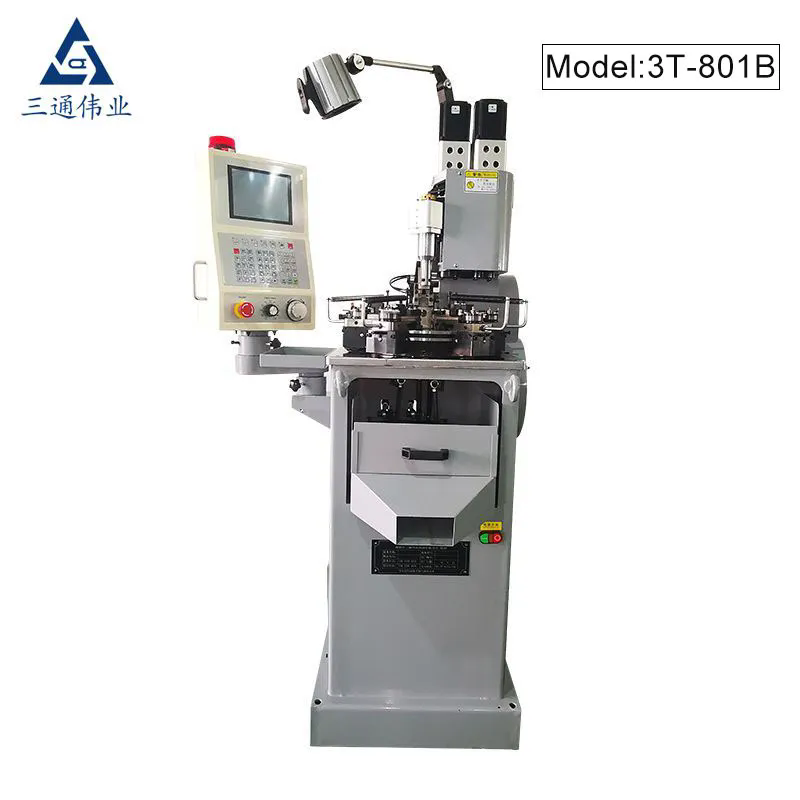What Is a Circular Coil Winding Machine and How Does It Revolutionize Coil Production?
2024-11-18
Coil winding is a crucial process in various industries, from electrical engineering to the manufacturing of transformers and motors. But what exactly is a circular coil winding machine, and why is it such a vital tool in coil production? In this blog post, we'll explore the significance of this specialized machine and how it helps manufacturers produce high-quality coils for a range of applications.
What Is a Circular Coil Winding Machine?
A circular coil winding machine is a type of automated equipment used for winding wire or cable into a circular shape or coil. This machine is often used in industries like electrical, automotive, and industrial manufacturing, where precision and consistency in coil production are essential. It operates by winding wire around a core or drum in a circular pattern, typically creating coils that are used in inductors, transformers, motors, and other electrical components.
The circular coil winding machine can vary in complexity, ranging from simple manual or semi-automatic models to fully automated, computer-controlled systems. These machines are designed to provide high precision and efficiency, allowing manufacturers to create coils that meet exact specifications for a variety of uses.
How Does a Circular Coil Winding Machine Work?
The process of winding coils using a circular coil winding machine involves several key steps:
1. Wire Feeding: The machine pulls wire from a spool and feeds it onto the winding drum or core. The wire is typically guided through rollers or guides to ensure smooth, uniform feeding.
2. Winding Process: As the wire is fed onto the winding core, the machine begins to wind it in a circular pattern. The motion of the drum and the wire’s tension are controlled to ensure that the coils are wound tightly and uniformly.
3. Layering: Depending on the design, the machine may wind multiple layers of wire over the base coil. This is critical for achieving the desired electrical properties, such as the resistance or inductance of the coil.
4. Cutting: Once the winding is complete, the machine cuts the wire and finishes the coil. Some machines also incorporate automatic tie-off or securing mechanisms to ensure the coil stays intact.
5. Inspection and Quality Control: Many advanced circular coil winding machines come with built-in sensors or cameras that monitor the quality of the winding process. These systems help detect any defects, such as uneven windings or wire misalignment, before the coil is finished.
Why Are Circular Coil Winding Machines Important?
1. Precision and Consistency
One of the main advantages of a circular coil winding machine is its ability to produce coils with high precision and consistency. In industries where electrical performance is critical, even the slightest variation in coil shape or winding tension can lead to problems such as poor signal transmission, overheating, or electrical failure. Automated winding machines ensure that coils are made to exact specifications, improving the reliability of the final product.
2. Efficiency and High Production Speed
Circular coil winding machines significantly increase production efficiency. With automated systems, coils can be wound much faster than by hand, which is crucial in industries with high demand, such as electronics and automotive manufacturing. These machines can operate continuously, reducing downtime and increasing the overall output of coils.
3. Customization and Versatility
Modern circular coil winding machines offer a high degree of customization. Operators can adjust parameters such as winding speed, wire tension, and the number of layers to produce coils with specific characteristics. This versatility makes these machines ideal for manufacturing a wide range of coil types, from small inductors used in electronic devices to large coils for industrial applications.
4. Cost-Effectiveness
Although the initial investment in a circular coil winding machine can be significant, the long-term cost savings are considerable. The increased speed, reduced labor costs, and decreased material waste lead to lower production costs. Additionally, the ability to produce coils with fewer defects reduces the need for rework and scrap material.
Applications of Circular Coil Winding Machines
Circular coil winding machines are used in a variety of industries where coil production is essential. Some common applications include:
- Transformer Manufacturing: In the production of transformers, coils are used to create magnetic fields that facilitate the transfer of electrical energy. Circular coil winding machines are essential for producing precise and high-quality coils that meet the strict specifications required for electrical transformers.
- Inductor and Capacitor Production: Inductors and capacitors are fundamental components in many electronic devices. Circular coil winding machines allow manufacturers to create coils with specific inductance values, ensuring the proper functioning of these components in circuits.
- Electric Motors: Electric motors rely on coils to create magnetic fields that generate movement. The precise and efficient coil-winding process enabled by these machines is critical in the production of high-performance motors used in everything from home appliances to industrial machinery.
- Automotive Industry: Coils are used in automotive applications, such as ignition systems and sensors. Circular coil winding machines help manufacturers produce the coils needed for these crucial components.
- Renewable Energy: In renewable energy systems, such as wind turbines and solar power systems, coils are used in generators and power inverters. High-quality coils produced by circular coil winding machines are essential to the efficiency and durability of these systems.
Types of Circular Coil Winding Machines
Circular coil winding machines come in various models, each suited to different applications and production needs. Some common types include:
- Manual and Semi-Automatic Models: These machines are typically used in smaller-scale operations or for producing low volumes of custom coils. While they require more operator involvement, they still offer greater efficiency and consistency than hand-winding.
- Fully Automated Models: These machines are designed for high-volume production and feature advanced features such as computer control, real-time monitoring, and automatic wire cutting and tying. They can produce coils at high speeds with minimal operator intervention.
- Multi-Spindle Machines: These models are equipped with multiple spindles, allowing the simultaneous winding of several coils at once. Multi-spindle machines are ideal for mass production and can drastically increase output.
Choosing the Right Circular Coil Winding Machine
When selecting a circular coil winding machine, several factors need to be considered, including:
- Coil Size and Type: Different machines are better suited for small or large coils. Consider the specifications of the coils you need to produce before choosing a machine.
- Wire Type: The type of wire, such as copper, aluminum, or specialty alloys, will influence the choice of machine. Some machines are specifically designed to handle certain types of wire materials.
- Production Volume: For high-volume production, an automated or multi-spindle machine may be the best choice. For low-volume or custom coil production, a manual or semi-automatic model might suffice.
- Budget: Circular coil winding machines come at various price points, depending on their features and automation level. Consider your budget and the long-term benefits of increased efficiency and precision when making your decision.
Conclusion
A circular coil winding machine is an indispensable tool in modern manufacturing, offering efficiency, precision, and versatility in coil production. Whether you're creating components for transformers, electric motors, or renewable energy systems, this machine ensures that your coils are wound to exact specifications, improving product quality and reducing costs. As industries continue to demand higher production rates and more precise components, the role of the circular coil winding machine will only become more critical.
What types of coils do you produce in your industry, and how has automation impacted your production process? Let us know in the comments!



